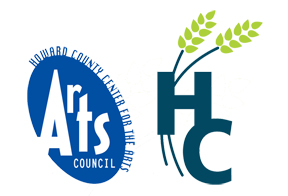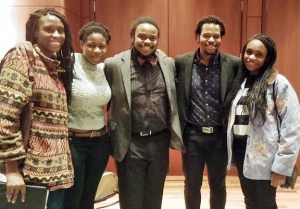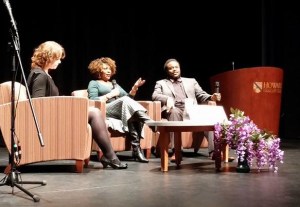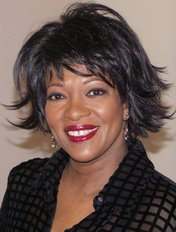Home » Posts tagged 'Rita Dove'
Tag Archives: Rita Dove
A Poem for Freedom: HoCoPoLitSo presents its third Poetry Moment
The former National Poet Laureate and official national treasure Rita Dove stars in this week’s Poetry Moment, featuring her poem “Lady Freedom Among Us.”
In an episode of The Writing Life, Dove explains to fellow poet Michael Collier that in 1993, she walked down to see the massive bronze statue of Freedom. The statue was lowered from its perch atop the U.S. Capitol Building by helicopter in May 1993 for repair and cleaning.

Dove thought the statue looked disheveled and dirty, rather like a homeless woman, and was inspired to write a poem.
Freedom, who wears a helmet of stars topped with an eagle’s head and a robe trimmed in fur, holds a sheathed sword, a laurel wreath, and the shield of the United States. On Oct. 23, 1993, when the buffed-up and repaired statue was lifted back onto its pedestal atop the Capitol building, Dove read her poem for the ceremony.
Dove visited HoCoPoLitSo audiences in 1999 and in 2015. In this clip, Dove reads her poem about the statue, “Lady Freedom Among Us” from her book On the Bus with Rosa Parks.
— Susan Thornton Hobby
Producer of The Writing Life
HoCoPoLitSo Stands Against Racism; Poetry is One of Our Weapons
HoCoPoLitSo was founded to celebrate diverse literary heritages and to foster literary appreciation in diverse populations, including varying gender, ethnic and cultural identities, age groups, and income levels. We believe that opening a book, reading a poem, or attending a literary event can be a powerful humanistic journey of exploration, education, and enlightenment. We all benefit when we seek to deepen and extend our understanding of the experiences of others and ourselves.
We are profoundly sad and outraged by the violence perpetuated against black lives and by the ongoing systemic lack of accountability. We believe black lives matter, and we stand in solidarity with all those seeking to effectuate long-lasting change in our communities.
In an effort to do our part, we offer something new — HoCoPoLitSo’s Poetry Moment — as a way to address, extend, and deepen these crucial conversations. Starting today, we will be showcasing poems written and read aloud by black authors hosted by HoCoPoLitSo over our forty-five years, whose art examines and illuminates our American experience.
— The board and staff of HoCoPoLitSo
Poetry for the Young (and the Young-hearted).
HoCoPoLitSo’s forty years are full of cherished memories. In this blog post, board member Laura Yoo shares a favorite recent memory from the 2014 Lucille Clifton Poetry Series Reading with Rita Dove and violinist Joshua Coyne.
I was wowed, moved, and inspired during Rita Dove’s reading and Joshua Coyne’s music this past October. Their performances and their talk, facilitated by HoCoPoLitSo’s Co-Chair Tara Hart, was engaging and fascinating.
But in my memory of that evening, I am thinking of three young women that I met after the event. They were simply giddy with excitement. They stood behind me in line to have their programs signed by Ms. Dove. They whispered to each other, “That was so cool” and “I wonder if she’d take a picture with us?” I offered to take a picture of them with Ms. Dove, and later they also posed with Coyne and his friend Emmett Tross the singer. These three young women were stirred by the whole evening.
While the performance by Dove and Coyne was phenomenal, it’s these three young women who linger in my memory after the event. I keep thinking, how can we get more of that?
Even as a professor in the English department at Howard Community College, I don’t often witness such excitement about literature, especially poetry, from young people. And this makes me sad. I just want to grab them and say, “Can’t you see? Don’t you see just how beautiful and amazing these words are?”
I think we’re all born with the capacity for creativity, and for poetry. Poetry is everywhere in the lives of children. Everything they do rhymes and the very way they acquire language itself is poetic. My kindergartener says that at school, before they eat, they say to each other, “Bon appetit. Now you may eat!” You can’t tell me that’s not poetry.
In his famous TED Talk, Sir Ken Robinson says that schooling kills creativity, and I wonder if it also kills interest in experiencing others’ creative productions like poetry. Schooling has become a pragmatic and utilitarian endeavor. There is very little room for what are (inaccurately) perceived to be purely aesthetic endeavors like literature and other forms of art. But what many don’t realize is that there is so much usefulness in literature. Steve Strauss, a columnist for USA Today and a small business expert, tells us about a research on the impact of studying literature,
Keith Oatley, one of the researchers, said the reason fiction improves empathy is because it helps us to “understand characters’ actions from their interior point of view, by entering into their situations and minds, rather than the more exterior view of them that we usually have.” This improves interpersonal understanding and enhances relationships with customers and business associates. When you hire an English major, you’re likely hiring someone who brings cognitive empathy to the table. (from “Why I Hire English Majors” in The Huffington Post)
So literature is not only beautiful but also useful.
 By the time young people graduate high school and enter a college course like introduction to literature, many of them see literature as a chore and poetry as a mystery. When it comes to literature, most of them stand somewhere between empathy and fear – and perhaps those two feelings are not mutually exclusive.
By the time young people graduate high school and enter a college course like introduction to literature, many of them see literature as a chore and poetry as a mystery. When it comes to literature, most of them stand somewhere between empathy and fear – and perhaps those two feelings are not mutually exclusive.
One way that HoCoPoLitSo tries to cure young people of this fear is through our Writer-in-Residence program. This year, Joseph Ross of Meeting Bone Man (2012) and Gospel of Dust (2013) is visiting high schools in Howard County for poetry workshops. He writes in his blog about the students he worked with at Homewood:
They were asking to be seen and heard, “tenderly.” […] While these young people had been through some difficult times, they used poetry to name their sadnesses and to face them. This is what the power of poetry looks like.
In addition, for many years HoCoPoLitSo has worked with Bill’s Buddies of the Folger Shakespeare Library to visit Howard County schools. This year, thanks to HoCoPoLitSo’ s sponsors and partners, middle school students from all over the county were visited by actors from Center Stage.
Recently, I learned that those three young ladies at the Dove and Coyne event were Nsikan Apkan and her two sisters. Nsikan is a student at Howard Community College with great interest in poetry. She even wrote an article about the event for HCC Times (check out page 19 of the October 2014
issue).
We also have young people like Katy Day who is HoCoPoLitSo’s Student on Board and a student at University of Maryland, College Park, studying English and Psychology as well as Faheem Dyer who is HoCoPoLitSo’s student intern from Atholton High School. You can read about Katy’s curious claim that “humanities ain’t like the Pre-Chew Charlie’s” and read Faheem’s review of the Dove and Coyne event for the Raider Review.
Young people like Nsikan, Katy, and Faheem will create and carry the future of poetry and literature in Howard County, in Maryland, in the US, and in the world.
In the next few weeks, I will share with you my interviews with Katy, Faheem, and Nsikan. They will tell you what draws them to literature, to poetry in particular. They will tell you about the future of poetry. And we will all see that we need not lose heart about the future of literature, of poetry. We have Katy, Faheem, and Nsikan.
Keep calm and read on.
— Laura Yoo
HoCoPoLitSo Board Member
Have a favorite HoCoPoLitSo memory? Share it with us through this online form and you may find the story the subject of a future blog post.
Rita Dove and Joshua Coyne Bring History to Life with Poetry and Music.
HoCoPoLitSo has a history of pulling together people, words and music. A forty-year history, in fact.
On Oct. 22, HoCoPoLitSo made history again at a celebration of its fortieth anniversary, a free multi-media event called “A Word of Difference: Rita Dove and Joshua Coyne Celebrate History and Creativity.”
For the first time, prodigy violinist Joshua Coyne and former U.S. Poet Laureate Rita Dove shared the stage to perform works inspired by an almost-forgotten eighteenth-century Afro-Polish musician — George Augustus Polgreen Bridgetower. Dove read poems from her biographical book of poems about Bridgetower, Sonata Mulattica, and Coyne played his own composition, “Fingers,” a plaintive work meant to embody Bridgetower’s doomed career. The program was filmed by a crew from Spark Media for a documentary of the same name as Dove’s 2009 book, and a selection of scenes from the documentary premiered at the HoCoPoLitSo event.
Dove, whose book was described by the New Yorker as “a virtuosic treatment of a virtuoso’s life,” explained Bridgetower’s story at the reading. First, a musical tot is discovered in the servant’s quarters and given a tiny violin, an overbearing African “prince” as a father showcases his son’s prodigious talents, the boy’s talent blossoms under Haydn’s tutelage and the patronage of the Prince of Wales. Then, as a youth, Bridgetower meets Beethoven.
Beethoven and Bridgetower collaborate on an intricate sonata, which the going-deaf composer dedicates to his “crazy mulatto,” according to historical letters. Then the story turns even more soap opera: the handsome young Bridgetower either insults or flirts with or steals (according to one’s perspective) a young woman that Beethoven has been coveting.
The elder musician rages, tears up the dedication page, and Bridgetower retreats from Vienna in shame. His career skids to a halt a scant decade or so after it began. He dies in the London slums seventy years after he played in Paris to great acclaim.
Dove read a poem about the father giving his boy “The Wardrobe Lesson,” so he’ll dress in bright colors and flowing costumes to highlight his “exotic” background. She read “Augarten, 7 a.m.,” about the early-morning concert that premiered the sonata, which Beethoven later rededicated to violinist Rodolphe Kreutzer, who pronounced it so complicated it was “unplayable.” She concluded the reading with “The End, with Mapquest,” about her family’s trip to find the spot where Bridgetower died, in south London, asking at last, “how does a shadow shine?”
After Coyne’s two original songs were performed, one based on Langston Hughes’ poem “A Dream Deferred” and sung by Emmett Gabriel Tross, and the second played by Coyne on the violin, Dove and Coyne sat down for a discussion with the audience, moderated by HoCoPoLitSo board co-chair Tara Hart.
The two artists talked about when they first met and how they threw back and forth improvisations on free verse and piano music. And Dove explained that she formerly played cello.
“I must have music in my life,” she said. “Poetry can make the language sing, and like music, can create an emotion that is speechless.”
Coyne talked about playing the Bridgetower sonata, about it being a dialogue between the piano and the violin, and how “it is a killer,” he laughed.
And they offered advice to artists everywhere, on which work was the hardest they have composed (both agreed, they were all the hardest), and to learn to relax about creating.
“This is not a race to be an artist,” Dove said. “It feeds something in you.”
Coyne agreed: “Make sure you’re not going too fast to notice things.”
Outside, after the cheese and fruit were picked clean, and the red-clad volunteers from Columbia’s Delta Sigma Theta alumnae chapter had gone home, Dove lingered for photos and signatures on her books. Across the glossy foyer, sticky notes papered a column with thoughts about the evening written by audience members: “DEEP,” “inspiring,” “awesome,” they read.
This performance was presented free to audience members to commemorate the first reading HoCoPoLitSo offered, in November, 1974, by the late poets Lucille Clifton and Carolyn Kizer. HoCoPoLitSo is grateful to partners and donors that made the evening possible — the Alpha Phi Alpha Foundation, Candlelight Concert Society, the Columbia Film Society, the Howard Community College Music Department and the Columbia (Md.) Alumnae Chapter of the Delta Sigma Theta Sorority.
To help HoCoPoLitSo continue pull together programs of this variety and quality, and make them available to all in the community, please consider making a donation.
Susan Thornton Hobby
Recording Secretary
Rita Dove & Joshua Coyne • Oct 22nd
A Word of Difference: Rita Dove and Joshua Coyne Celebrate History and Creativity
Wednesday, October 22, 2014 • 7:30 p.m.
Monteabaro Recital Hall
Howard Community College
In celebration of HoCoPoLitSo’s 40th year, former National Poet Laureate Rita Dove will read from her acclaimed most-recent book of poems, Sonata Mulattica, about historical Afro-European violinist George Bridgetower. Violin virtuoso Joshua Coyne will play original music inspired by literature. Coyne’s story as a young African-American classical musician is juxtaposed with Bridgetower’s in the upcoming documentary film Sonata Mulattica, which also features Dove.
Extended scenes from the film will premiere at the event, followed by a discussion with Dove, Coyne, and the film’s creators.
The book Sonata Mulattica has been described by the American Library Association as “a mischievous and sensuous cycle of linked poems that explores genius and power, class and race.”
Presented in partnership with Candlelight Concert Society, Columbia Film Society, the Howard Community College Music Department, and the Columbia (MD) Alumnae Chapter of the Delta Sigma Theta Sorority.
Register HERE for this free event.









